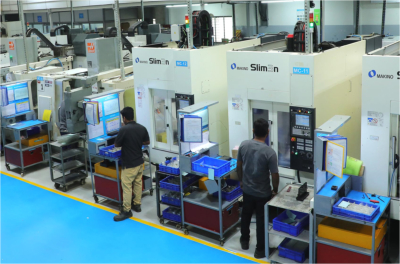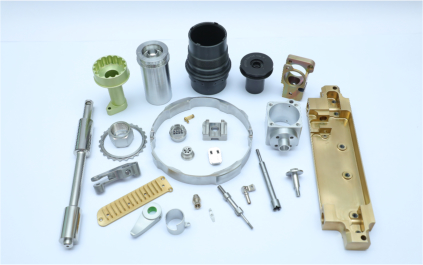Published on: Sunday, 03 November 2024 ● 6 Min Read
 In this exclusive interview, Anuj Jhunjhunwala, Managing Director and CEO of JJG Machining Group, shares his insights on the rapidly evolving aerospace manufacturing landscape in India. With over 18 years of experience, Anuj discusses the challenges and opportunities ahead, the transformative impact of the "Make in India" initiative, and his vision for positioning Indian companies on the global stage. Under his leadership, JJG has become a key player in the aerospace sector, driving innovation and sustainability.
In this exclusive interview, Anuj Jhunjhunwala, Managing Director and CEO of JJG Machining Group, shares his insights on the rapidly evolving aerospace manufacturing landscape in India. With over 18 years of experience, Anuj discusses the challenges and opportunities ahead, the transformative impact of the "Make in India" initiative, and his vision for positioning Indian companies on the global stage. Under his leadership, JJG has become a key player in the aerospace sector, driving innovation and sustainability.
How do you assess the current state of the aerospace manufacturing industry in India?
India’s aerospace manufacturing industry, particularly in the civil aircraft segment, is in an early but promising stage. Currently, India's share is below 1% of the global market, however, the industry is poised for rapid growth, with projections to reach between 3-5% by the decade's end. Several factors are driving this shift, including an increase in domestic demand for air travel, investment in advanced manufacturing capabilities, and strategic support from the government through initiatives like "Make in India."
What are the major challenges Indian aerospace manufacturers face in competing with established markets like the U.S. and Europe?
To compete, Indian aerospace component manufacturers need to build trust with Western aircraft manufacturers, such as Airbus and Boeing, and major engine producers like GE and Pratt & Whitney, as well as their Tier-1 suppliers. Confidence in our reliability and scalability is essential, and Indian companies, including ours, have made strides toward this by securing critical certifications and customer approvals over the past decades.
How is the "Make in India" initiative influencing the aerospace sector?
The "Make in India" initiative has been instrumental in positioning India as a competitive player in the global aerospace industry. This initiative has not only increased India's attractiveness for foreign investments but also strengthened domestic manufacturing capabilities through policy support, incentives, and infrastructure development. By promoting a robust local supply chain, the government has set the foundation for creating a sustainable aerospace ecosystem in India. As a result, companies across the aerospace value chain are now more focused on establishing advanced production facilities and obtaining critical certifications that align with international standards. While efforts to join the global supply chain were already underway in India before "Make in India," the initiative has amplified these efforts, with a noticeable uptick in collaboration between Indian manufacturers and global aerospace giants.

What specific measures do you think need to be implemented to strengthen the "Make in India" movement?
To enhance competitiveness, we need further advancements in energy availability, land quality, and skilled labor, which are foundational to strengthening India’s position against established aerospace manufacturing regions.
How has integrating nearly 98% locally sourced raw materials impacted your operations?
That statistic applies to our automotive division, where we source 98% locally. however in aerospace, local sourcing remains below 5% but is expected to grow as Indian steel and aluminum producers obtain the necessary certifications. This shift would significantly bolster India's manufacturing appeal.
What advantages do you see in local sourcing for aerospace manufacturing?
Currently, our end customers in aerospace are not based in India, so our local sourcing is more limited. However, an increase in certified local suppliers would certainly benefit the industry’s future.
What do you consider the most pivotal moments in JJG Machining Group's journey under your leadership?
One of the most pivotal milestones was the establishment of our dedicated aerospace facility in 2015, followed by the expansion to a second facility in 2023. These investments demonstrated our commitment to building long-term relationships with global aerospace clients by meeting their precise manufacturing standards. Additionally, maintaining our automotive components division has been invaluable, providing us with a stable revenue base and resilience, particularly during challenging periods like the COVID-19 pandemic. This diversified approach has allowed us to support the lengthy development cycles typical of the aerospace sector, giving us the patience and flexibility to grow steadily in this high-stakes industry.
How do you foster a culture of creativity and excellence to drive innovation within your team?
We focus on foundational practices from automotive manufacturing, such as Lean principles and continuous improvement, and adopt advanced techniques like Industry 4.0 integrations and productivity-enhancing software.
How has the recent funding of INR 100 Crores from CX Partners positioned JJG Machining Group for future growth?
This funding enables us to expand our Bommasandra facility in Bangalore, add new categories of machinery, and pursue further backward integration to increase our production capabilities.

What role does sustainability play in the aerospace industry’s future, and how is JJG leading by example?
Sustainability is essential to the aerospace industry, with an increasing focus on reducing emissions and energy use. At JJG Machining Group, we are committed to environmental leadership by achieving UN Scope 2 compliance by year-end through our solar park project, which will allow us to source renewable energy. We are also advancing our Scope 3 monitoring to lower emissions across our supply chain, from raw materials to product delivery. These initiatives position us as a sustainability-driven partner, aligning with our customers’ environmental goals while setting a high standard for responsibility in aerospace manufacturing.
Can you discuss the importance of your partnerships with global companies like Boeing and Collins Aerospace?
Our partnerships with leading global aerospace companies like Boeing and Collins Aerospace are foundational to our growth and success in the aerospace sector. These collaborations allow us to continuously enhance our technical capabilities, pushing us to meet the highest standards in precision and reliability. Through these partnerships, we’ve been able to invest in specialized machining and advanced metal finishing processes, driven by project-specific needs that require high complexity in geometries and surface treatments. Serving in the Build-to-Print segment, we focus on delivering parts exactly to client specifications, which has enabled us to advance up the value chain and expand our expertise in high-performance components. Furthermore, these relationships provide invaluable insights into global trends, technologies, and customer expectations, enabling us to stay competitive and innovate in ways that directly align with industry needs.
What do you envision for the future of Indian aerospace manufacturing in the next decade?
We anticipate that India's share in the global aerospace supply chain will grow from the current 1% to 3-5% by 2030, with increased production of complex components, sub-assemblies, and assemblies.
What advice would you give to emerging entrepreneurs in the aerospace sector?
Patience is crucial—this industry is known for its long gestation periods. Additionally, maintain high standards and prioritize compliance.
What personally motivates you to lead in this industry, and what legacy do you hope to leave?
Being part of an industry that exemplifies engineering excellence is profoundly motivating. Knowing that hundreds of our components are on each aircraft is rewarding, and we aim to establish JJG as India’s premier aerospace precision components company.
No comments posted
© 2019 KIVAA Group | All right reserved. www.theindustrial.in
Leave a reply: